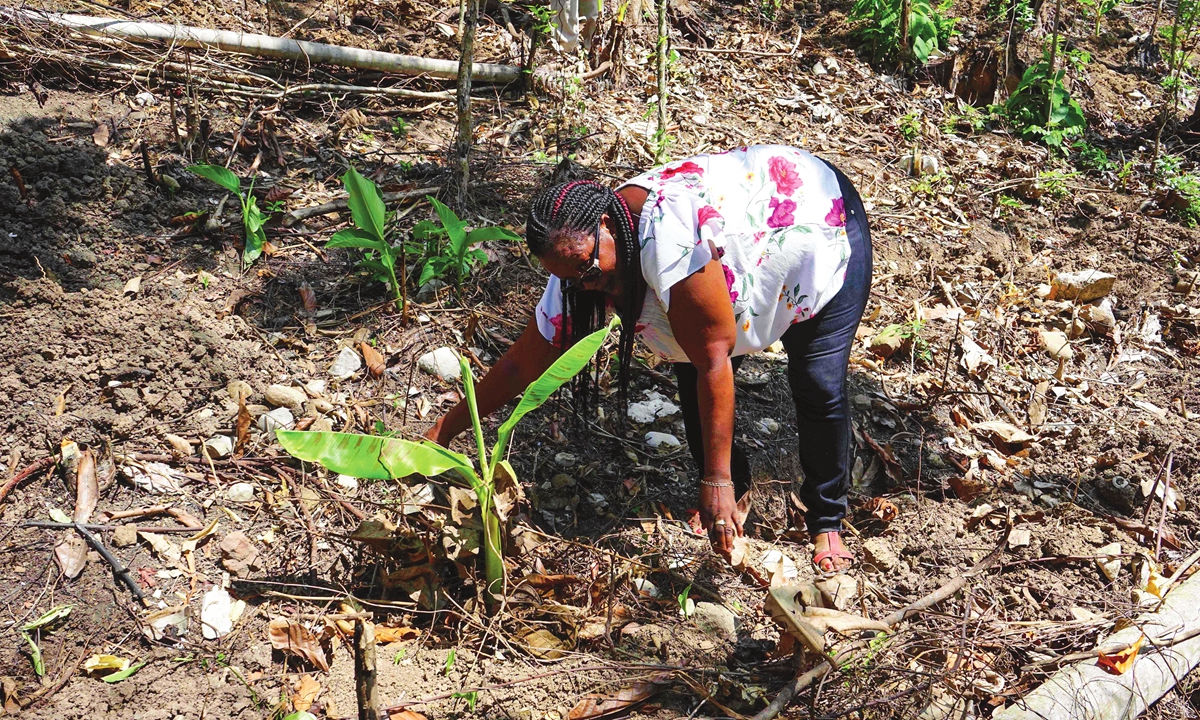Jamaican women worst hit by livestock and crop theft in pandemic
Source: Reuters Published: 2020/11/17 17:53:41
Early each morning, Pamelita Dann arrives at her farm in eastern Jamaica hoping thieves have not stolen any of her crops. She carefully checks the onions, watermelon and papayas - more often than not, something has been snatched overnight.

"It happens every other day. As long as [the produce] is there, they will steal it," she said.
The theft of livestock, crops and farming equipment - known as praedial larceny - is on the rise in Jamaica, say farmers and police, as the economic impact of the COVID-19 pandemic pushes criminals to find new ways to fund their illegal activities.
"A lot of the things they steal end up on the black market," said Gary Welsh, assistant commissioner of police with the Jamaica Constabulary Force (JCF), adding that women farmers are more susceptible to being targeted.
"Women feel vulnerable, and thieves prey upon them because they are less likely to retaliate," he told Reuters.
The most recent statistics from the JCF say there have been more than 900 instances of praedial larceny since 2014 across Jamaica. But Welsh warned that those numbers are "grossly underreported," mainly because farmers feel the police will not be able to offer immediate assistance.
Government responsibility
According to the government's Jamaica Agricultural Society (JAS), the theft of livestock, crops and agricultural equipment costs Jamaica up to 7 billion Jamaican dollars ($48 million) annually.
"The problem has gotten worse and worse," said Denton Alvaranga, the society's first vice president.
"When praedial thieves come, they might take a whole herd of cattle, and they tie up the farmer and sometimes kill them."
Police statistics reveal that 13 farmers have been killed by thieves so far in 2020.
Damien King, an economist and executive director of the Caribbean Policy Research Institute, a nonprofit think tank, said agricultural theft is a crime of opportunity, as so much property around the country is not properly secured. Government investment in helping farmers protect their property would have far-reaching benefits, he said.
"No one wants to invest in farming if they won't get to reap their own crops," King said in emailed comments.
Newspaper headline: Stolen livelihoods

Farmer Joan Johnson plants a banana tree in Enfield, St. Mary, Jamaica on August 28, 2019. Photo: AFP
Over the 14 years Dann has been cultivating her 0.8-hectare plot in Poor Man's Corner, a rural community an hour east of the capital, Kingston, the 60-year-old farmer has had about $3,500 worth of crops, fertilizer and tools stolen."It happens every other day. As long as [the produce] is there, they will steal it," she said.
The theft of livestock, crops and farming equipment - known as praedial larceny - is on the rise in Jamaica, say farmers and police, as the economic impact of the COVID-19 pandemic pushes criminals to find new ways to fund their illegal activities.
"A lot of the things they steal end up on the black market," said Gary Welsh, assistant commissioner of police with the Jamaica Constabulary Force (JCF), adding that women farmers are more susceptible to being targeted.
"Women feel vulnerable, and thieves prey upon them because they are less likely to retaliate," he told Reuters.
The most recent statistics from the JCF say there have been more than 900 instances of praedial larceny since 2014 across Jamaica. But Welsh warned that those numbers are "grossly underreported," mainly because farmers feel the police will not be able to offer immediate assistance.
Government responsibility
According to the government's Jamaica Agricultural Society (JAS), the theft of livestock, crops and agricultural equipment costs Jamaica up to 7 billion Jamaican dollars ($48 million) annually.
"The problem has gotten worse and worse," said Denton Alvaranga, the society's first vice president.
"When praedial thieves come, they might take a whole herd of cattle, and they tie up the farmer and sometimes kill them."
Police statistics reveal that 13 farmers have been killed by thieves so far in 2020.
Damien King, an economist and executive director of the Caribbean Policy Research Institute, a nonprofit think tank, said agricultural theft is a crime of opportunity, as so much property around the country is not properly secured. Government investment in helping farmers protect their property would have far-reaching benefits, he said.
"No one wants to invest in farming if they won't get to reap their own crops," King said in emailed comments.
Newspaper headline: Stolen livelihoods
Posted in: AMERICAS